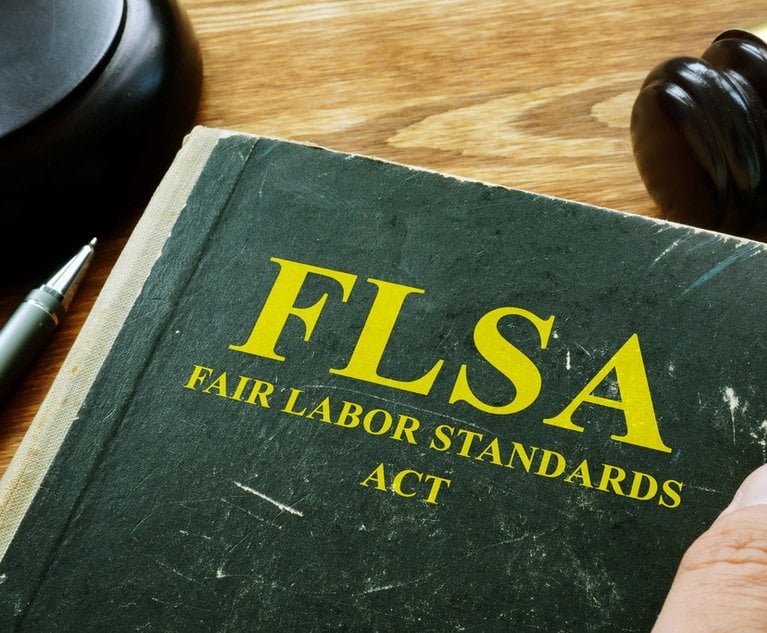Is an FLSA Earthquake Heading Our Way?
The meaning of this phrase and the nature and extent of the U.S. Department of Labor's (DOL) authority to "define and delimit" the so called "white collar" or "EAP" exemption recently has been called into question by U.S. Supreme Court Justice Brett Kavanaugh's dissenting opinion (which was joined by Justice Samuel Alito) in Helix Energy Solutions Group v. Hewitt.
March 27, 2023 at 01:56 PM
6 minute read
By Andrea M. Kirshenbaum
 Andrea M. Kirshenbaum shareholder with Littler Mendelson. Courtesy photo
Andrea M. Kirshenbaum shareholder with Littler Mendelson. Courtesy photo Since its passage in 1938, the Fair Labor Standards Act (FLSA) has exempted, "any employee employed in a bona fide executive, administrative, or professional capacity … (as such terms are defined and delimited from time to time by regulations of the secretary …)" from the requirement to pay minimum wage or overtime to employees. The meaning of this phrase and the nature and extent of the U.S. Department of Labor's (DOL) authority to "define and delimit" the so called "white collar" or "EAP" exemption recently has been called into question by U.S. Supreme Court Justice Brett Kavanaugh's dissenting opinion (which was joined by Justice Samuel Alito) in Helix Energy Solutions Group v. Hewitt.
For more than 80 years, the DOL's regulations implementing the EAP exemption have required that in order to qualify for the exemption from minimum wage and overtime: the employee must be paid a predetermined and fixed salary not subject to reduction due to variations in the quality or quantity of work performed (the "salary basis test"); the salary level must be at or above a minimum specified amount (the "salary level test"); and the employee's job duties must primarily involve executive, administrative, or professional duties as defined by DOL regulations (the "duties test"). These three requirements, which have formed the foundation of wage and hour law since 1940, may be headed for a legal challenge in a district court near you.
This content has been archived. It is available through our partners, LexisNexis® and Bloomberg Law.
To view this content, please continue to their sites.
Not a Lexis Subscriber?
Subscribe Now
Not a Bloomberg Law Subscriber?
Subscribe Now
NOT FOR REPRINT
© 2025 ALM Global, LLC, All Rights Reserved. Request academic re-use from www.copyright.com. All other uses, submit a request to [email protected]. For more information visit Asset & Logo Licensing.
You Might Like
View All
Third Circuit's 'Johnson v. NCAA' Opinion: What It Means for College Athletics and Beyond
6 minute read
'Utterly Bewildering': GCs Struggle to Grasp Scattershot Nature of Law Firm Rate Hikes

Health Care Worker Files Class Action Against Staffing Agency for Unpaid Meal Breaks
4 minute readLaw Firms Mentioned
Trending Stories
- 1US DOJ Threatens to Prosecute Local Officials Who Don't Aid Immigration Enforcement
- 2Kirkland Is Entering a New Market. Will Its Rates Get a Warm Welcome?
- 3African Law Firm Investigated Over ‘AI-Generated’ Case References
- 4Gen AI and Associate Legal Writing: Davis Wright Tremaine's New Training Model
- 5Departing Attorneys Sue Their Former Law Firm
Who Got The Work
J. Brugh Lower of Gibbons has entered an appearance for industrial equipment supplier Devco Corporation in a pending trademark infringement lawsuit. The suit, accusing the defendant of selling knock-off Graco products, was filed Dec. 18 in New Jersey District Court by Rivkin Radler on behalf of Graco Inc. and Graco Minnesota. The case, assigned to U.S. District Judge Zahid N. Quraishi, is 3:24-cv-11294, Graco Inc. et al v. Devco Corporation.
Who Got The Work
Rebecca Maller-Stein and Kent A. Yalowitz of Arnold & Porter Kaye Scholer have entered their appearances for Hanaco Venture Capital and its executives, Lior Prosor and David Frankel, in a pending securities lawsuit. The action, filed on Dec. 24 in New York Southern District Court by Zell, Aron & Co. on behalf of Goldeneye Advisors, accuses the defendants of negligently and fraudulently managing the plaintiff's $1 million investment. The case, assigned to U.S. District Judge Vernon S. Broderick, is 1:24-cv-09918, Goldeneye Advisors, LLC v. Hanaco Venture Capital, Ltd. et al.
Who Got The Work
Attorneys from A&O Shearman has stepped in as defense counsel for Toronto-Dominion Bank and other defendants in a pending securities class action. The suit, filed Dec. 11 in New York Southern District Court by Bleichmar Fonti & Auld, accuses the defendants of concealing the bank's 'pervasive' deficiencies in regards to its compliance with the Bank Secrecy Act and the quality of its anti-money laundering controls. The case, assigned to U.S. District Judge Arun Subramanian, is 1:24-cv-09445, Gonzalez v. The Toronto-Dominion Bank et al.
Who Got The Work
Crown Castle International, a Pennsylvania company providing shared communications infrastructure, has turned to Luke D. Wolf of Gordon Rees Scully Mansukhani to fend off a pending breach-of-contract lawsuit. The court action, filed Nov. 25 in Michigan Eastern District Court by Hooper Hathaway PC on behalf of The Town Residences LLC, accuses Crown Castle of failing to transfer approximately $30,000 in utility payments from T-Mobile in breach of a roof-top lease and assignment agreement. The case, assigned to U.S. District Judge Susan K. Declercq, is 2:24-cv-13131, The Town Residences LLC v. T-Mobile US, Inc. et al.
Who Got The Work
Wilfred P. Coronato and Daniel M. Schwartz of McCarter & English have stepped in as defense counsel to Electrolux Home Products Inc. in a pending product liability lawsuit. The court action, filed Nov. 26 in New York Eastern District Court by Poulos Lopiccolo PC and Nagel Rice LLP on behalf of David Stern, alleges that the defendant's refrigerators’ drawers and shelving repeatedly break and fall apart within months after purchase. The case, assigned to U.S. District Judge Joan M. Azrack, is 2:24-cv-08204, Stern v. Electrolux Home Products, Inc.
Featured Firms
Law Offices of Gary Martin Hays & Associates, P.C.
(470) 294-1674
Law Offices of Mark E. Salomone
(857) 444-6468
Smith & Hassler
(713) 739-1250






